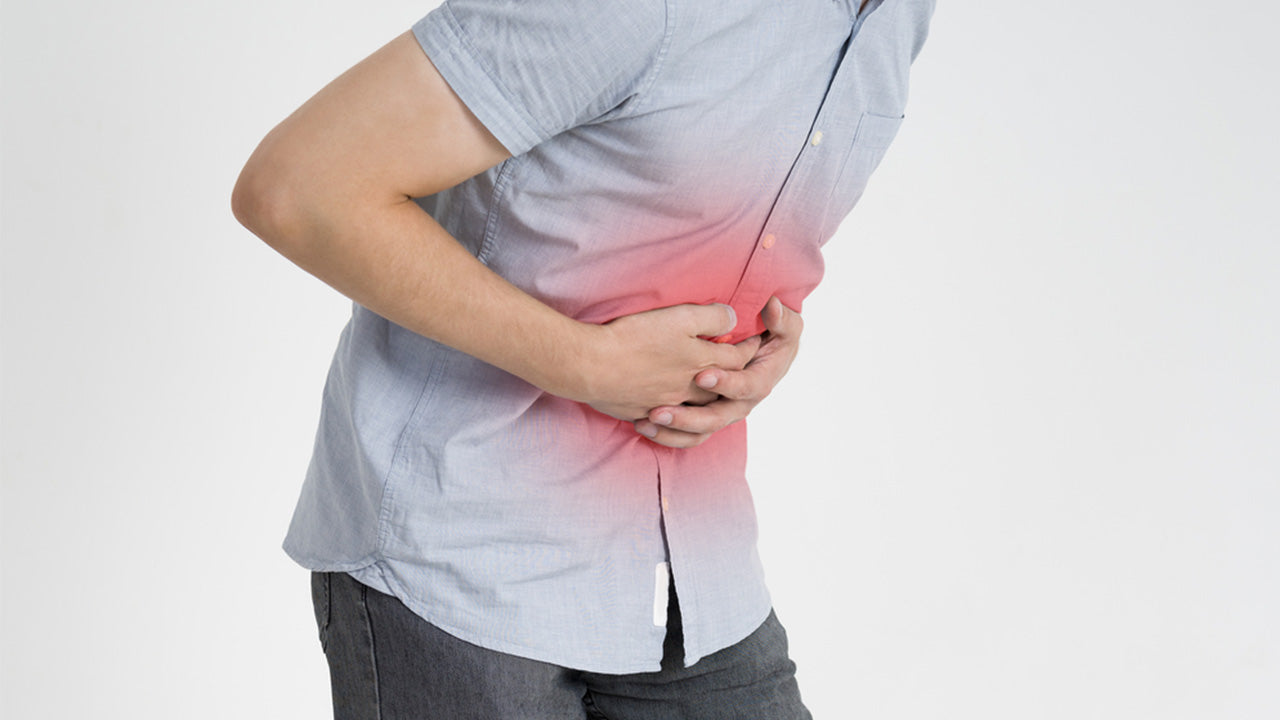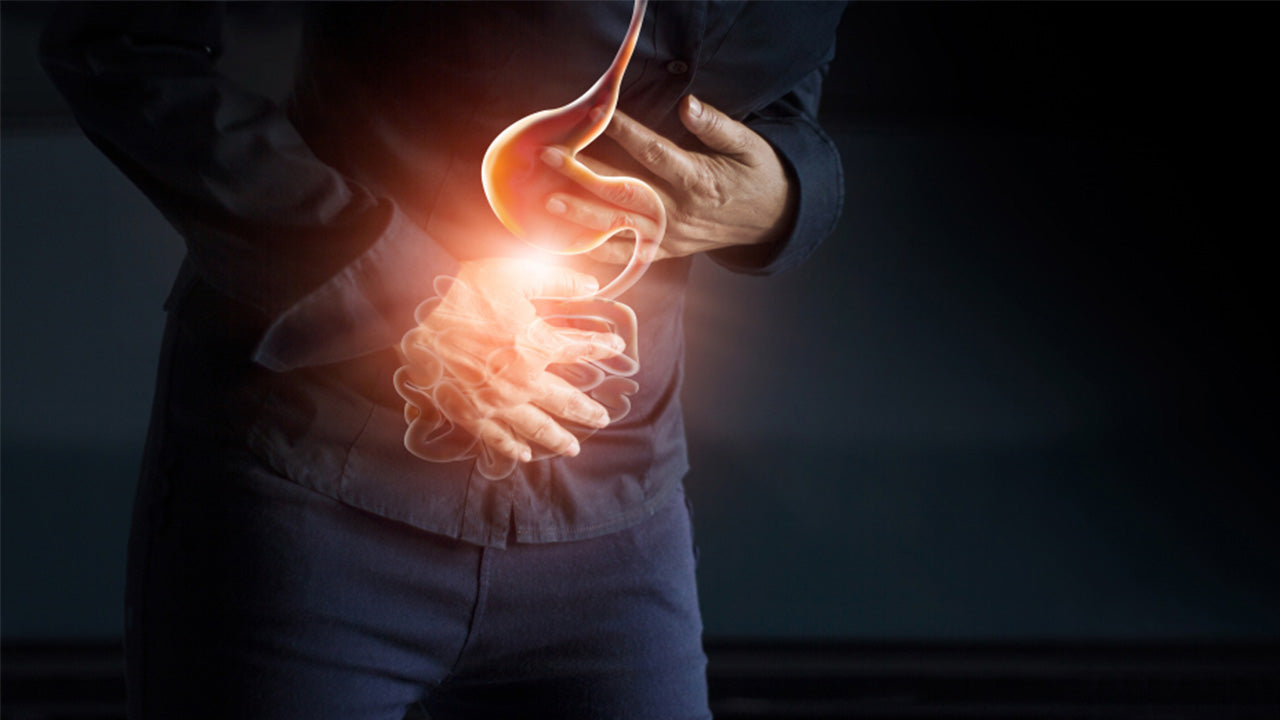Esophagitis: Symptoms, Causes and Treatments
 By: by Amino Science
By: by Amino Science

The esophagus is a muscular tube that transports food from your mouth to your stomach. Esophagitis is defined as inflammation, irritation, or swelling of that tube. It can be caused by viral or bacterial infections, medications, and acid reflux, the backup of stomach acids and other contents returning to the esophagus.
Esophagitis at a Glimpse
Before we tackle the specific types of esophagitis, let's get a general picture of this condition.
Common symptoms of esophagitis include:
- Problematic swallowing (dysphagia)
- Painful swallowing (odynophagia)
- Sore throat
- Cough
- Hoarse voice
- Acid reflux
- Chest pain that is worse when eating
- Nausea
- Vomiting
- Epigastric abdominal pain
- Decrease in appetite
- Weight loss
- Heartburn
Very young children may have difficulty feeding. If inflammation of the esophagus is not treated, conditions such as severe constriction of the esophageal tube, scarring, and ulcers can arise.
Seek the consult of your health care provider if you experience shortness of breath or chest pain, especially between meals, symptoms that last several days, symptoms that impair your ability to eat such as difficulty swallowing, and headache, fever, and muscle aches.
Immediate attention is required for continuous chest pain (even for more than a few minutes). Do not ignore this symptom, particularly if you have a history of heart problems, high blood pressure, or diabetes. Seek immediate treatment if food gets stuck in the esophagus or if you are unable to consume even small sips of water.
To treat esophagitis successfully, a physician must consider why the condition has occurred and how it relates to a patient’s overall health. If you are relatively healthy, appropriate treatment should improve your condition in a month or less. If you are battling an infection or your immune system is weak, recovery may take longer.
Chronic esophagitis can cause the esophagus to narrow and result in tissue damage if you do not get treatment. The possibility of esophageal cancer is greater if the cells lining the esophagus have changed due to chronic acid exposure.
Avoiding identified triggers lowers the risk of future bouts of esophagitis. Potential long-term health complications of untreated esophagitis are Barrett’s esophagus, damage to the lining of the esophagus leading to a precancerous change in the tissue, narrowing of the esophagus that can cause obstruction and problems swallowing, and holes or ulcers in the esophagus known as esophageal perforations.
Types of Esophagitis
Treatment of esophagitis depends on the type of esophagitis that's causing the health problem. Let's get familiar with the types below.
Eosinophilic Esophagitis
An overabundance of eosinophils, which are specialized white blood cells in the esophagus, causes eosinophilic esophagitis as the body overreacts to allergens. Children can experience difficulty eating when they have this condition, which can be caused by or irritated by food allergens, such as tree nuts, peanuts, eggs, milk, wheat, shellfish, and soy, or by inhaled allergens like pollen. One in ten thousand children may be subject to this kind of esophagitis, says Boston Children’s Hospital.
The National Organization for Rare Diseases explains that eosinophils are an important part of the immune system and play a role in immune regulation and fighting certain infections. Some individuals with this condition have been found to have an unusually high expression of a particular gene called eotaxin-3. This gene codes for a protein that is important in controlling the accumulation of eosinophils. This condition has been reported across multiple continents, including Europe, Australia, and America.
Those with eosinophilic esophagitis, both children and adults alike, show improvement when they remove the food causing the allergic reaction from their diets. Some people must meet their nutrient needs with a liquid diet administered through a feeding tube. Steroid medications are added when dietary changes are insufficient. Several endoscopies and biopsies are needed to monitor the effectiveness of treatment.
Researchers are attempting to develop medications designed to suppress the proteins produced due to eosinophilic esophagitis transcriptome and tissue inflammation, as well as to determine the role of interleukin-5, an eosinophil growth factor. Drugs that block this protein can lower eosinophil levels and are now FDA approved to treat eosinophilic asthma.
Reflux Esophagitis
Reflux esophagitis occurs when gastroesophageal reflux disease (GERD), a condition that arises when acidic stomach substances like acids regurgitate into the esophageal tube, irritates and inflames the esophagus. When people have suffered from GERD for many years, they may develop Barrett’s esophagus (BE), which in rare cases can develop into esophageal cancer.
At the lower end of the esophagus, a valve called the esophageal sphincter stops acids in the stomach from going back up into the esophagus. If the esophageal sphincter fails to open and close properly, stomach contents can migrate back up into the esophagus, irritating the esophagus and causing reflux esophagitis.
Drug-Induced Esophagitis
Certain medications taken without adequate water can stay in the esophageal tube for too much time and cause drug-induced esophagitis. Pills that are too big for people to swallow without problems can irritate the esophageal wall, and residue that comes from various kinds of medications remains in the esophagus. The most troublesome of these medications are bone loss minimizers, anti-inflammatory drugs, antibiotics, potassium chloride, and pain relievers.
Infectious Esophagitis
Viruses such as the herpes simplex virus, parasites, bacteria, or fungi can cause infectious esophagitis, a rare condition. It can be exacerbated by a weak immune system due to medications or disease conditions. People with lymphoma, cancer, leukemia, HIV, AIDS, or diabetes are more likely to contract this condition.
Other Causes of Esophagitis
Alcohol abuse, chemical injury from ingested alkaline or acid solutions, and the use of radiation therapy and nasogastric tubes have been implicated as additional esophagitis causes. Keeping cleaning solutions and other toxic chemicals away from children can prevent esophageal injury.
Risk Factors for Esophagitis
In addition to a weakened immune system, risk factors for esophagitis include:
- Hiatal hernia
- Chemotherapy
- Radiation therapy of the chest
- Surgery in the chest area
- Medications to prevent organ transplant rejection
- Immunosuppressive medications used to treat autoimmune diseases
- Aspirin and anti-inflammatory medications
- Chronic vomiting
- Obesity
- Alcohol and cigarette use
- A family history of allergies or esophagitis
The chance of developing a viral infection of the esophagus is low if a person has a healthy immune system.
If a person has GERD, the following specific risk factors can heighten the likelihood that he or she will develop reflux esophagitis.
- Excess weight or obesity
- Pregnancy
- Smoking
- Regular consumption of a high intake of:
- Tomato-based foods
- Citrus fruits
- Chocolate
- Garlic
- Onions
- Spicy foods
- Alcohol
- Caffeine
- Food allergies
- Medications, especially having to swallow large pills
- Lying down immediately after a meal
- Taking medications when lying down
- Taking medications before going to bed
- Infections
Diagnosing Esophagitis
One form of diagnostic test is endoscopy with biopsies. Doctors insert the endoscope, a long, narrow tube with a small camera attached to the end, down the patient’s throat. After examining the esophagus, they will, if necessary, take a small tissue sample to ascertain the cause of the inflammation—an organism, allergen, cancer, or precancerous change.
A barium X-ray, also called an upper GI series, provides well-defined images of the esophagus that physicians use to examine structural changes.
Allergy testing may include skin tests performed to find out whether the patient is sensitive to one or more allergens. This may involve a skin-prick test, blood test, or elimination diet. Food elimination may be discussed after a diagnostic endoscopy.

Treating Esophagitis
Doctors prescribe medical or surgical treatments based on the diagnosis. Non-surgical solutions include oral steroids, antifungal or antiviral drugs, pain relievers, antacids, and proton pump inhibitors to eliminate the production of acid in the stomach. A surgical solution can widen the opening in the esophagus to eliminate food congestion.
Another potential solution for relieving the symptoms of esophagitis is to do away with foods that cause allergic reactions, hard food, raw food, and food and drink that is spicy or acidic. Doctors also suggest common-sense solutions such as chewing food adequately, taking smaller bites, and quitting drinking and smoking.
For reflux esophagitis, doctors often prescribe drugs that can reduce gastric acid production, such as acid blockers like proton pump inhibitors and H2-blockers. Another treatment is fundoplication, surgery to treat GERD in which part of the stomach is wrapped around the lower esophageal sphincter to strengthen it and prevent stomach acid from coming back to the esophagus.
For eosinophilic esophagitis, doctors often prescribe corticosteroids, which are oral medications that can reduce allergy-related inflammation, thereby enabling the esophagus to heal. Another choice is inhaled steroids, which are often used to treat asthma. Patients with esophagitis related to allergies may have good results when using proton pump inhibitors if there is reflux as well.
When esophagitis is caused by certain medications, the doctor may prescribe an alternative medication, or change how it is administered. Patients may be advised to drink more water, and refrain from lying down for 30 minutes after eating or taking medication in pill form.
When esophagitis is caused by infections, the doctor will prescribe a specific medication to fight the infection.
Eliminating certain foods from one’s diet can be highly successful in treating adults who have eosinophilic esophagitis, as revealed by a recent study published in Clinical Gastroenterology and Hepatology, the journal of the American Gastroenterological Association.
In this retrospective cohort study of data collated from the University of North Carolina database from 2006 to 2012, researchers showed that 71% of people with the condition who eliminated certain targeted foods from their diet showed improvement of their symptoms, while nearly 80% of people who eliminated six foods experienced improvement. People who did the six-food plan were able to add back a food or food group in six-week increments. After conducting endoscopy, researchers found that dairy and eggs, each accounting for nearly half of the patients, were the most problematic foods.
Cutting out certain foods from your diet, however, can lead to nutrient deficiencies. To make sure you're feeding your body the essential amino acids it needs to build and maintain muscle tissue, create neurotransmitters for brain health, and fight off infection and illness, consider supplementing with a premium, trusted amino acid blend.
The good news is that esophagitis can be cured with appropriate lifestyle changes, dietary modifications, and adherence to your doctor's medical advice. One more reason to pay attention to the cues your body gives you and treat it right.

Up to 25% off Amino
Shop NowTAGS: conditions
Join the Community
Comments (0)
Most Craveable Recipes




 833-264-6620
833-264-6620



















